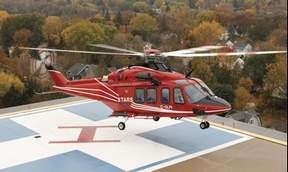While STARS (Shock, Trauma, Air Rescue Service) is about to be launched in Regina at the end of this month, not much is known as to when and how it will roll out to the rest of Saskatchewan.
The service incorporates ambulatory helicopters to airlift patients and victims from accident scenes and remote locations to central acute care hospitals, as an addition to the current fixed wing and road ambulance services in the province.
STARS will begin its operations in Saskatchewan from the Regina International Airport. The service is headquartered in Edmonton, Calgary and Grande Prairie where the BK 117 helicopters have been dispatched to provide service throughout Alberta since 1985.
The contract between the non-profit STARS and the government of Saskatchewan was signed one year ago with the aircraft to be dispatched from Regina and Saskatoon. It is expected that a larger helicopter, one that will be capable of flying longer distances under more extreme conditions in northern Saskatchewan will be put in service in Saskatoon this fall.
In the meantime, local paramedics and health care officials have been prepared for the new service by STARS personnel who have been visiting the various communities where the majority of the services will be provided, including Estevan.
The area where a helicopter landing pad can be built near St. Joseph's Hospital has been identified, said the hospital's executive director Greg Hoffort, but there has been no indication from STARS, the Ministry of Health nor Sun Country Health Region as to when it will be built, at what cost and who will be paying for it.
"We've only heard rumblings so far," said Hoffort. "All we know is that the service is launching in Regina April 30."
Hoffort said that when the announcement was made in April of last year, there were follow-up planning sessions where it was indicated that the service would begin this year.
"We'd like to work with the City of Estevan on this. They're building a new water plant near here and if they have to remove a certain amount of dirt and clay and if that is what is needed to help build a landing pad, then it would be nice to work the two projects together and maybe save someone some money," Hoffort added.
The hospital's chief administrator said he had heard rumours that the pad could cost as much as $500,000 and at first it was believed that the provincial treasury was going to be responsible for meeting these unexpected costs but now he said, "we're hearing that maybe they're going to try to implement the 80-20 split formula, meaning we'd be responsible for meeting 20 per cent of that cost, which might mean as much as $100,000. But so far, no official word in either direction, just rumours."
Hoffort said the health region will be made aware of the possibility of cutting costs through the use of excavation materials from the City's water plant project, in the event a decision to build the pad is coming down soon. A meeting with STARS is on the agenda within the month, he said, "but so far we don't know much about it, so we're all doing a lot of speculating and there are too many unknowns so far to make any kind of definite statement."
STARS will begin operations with 20 aero-medical personnel on hand, meaning pilots, flight paramedics and maintenance people, and there will be another six employees dispatched throughout the province as support staff.
STARS will begin with daylight hour service only and will add 24-hour service once it gains Transport Canada's approval for full-time aeromedical facilities.
The Saskatchewan-based personnel have recently completed three months of intensive training which included flying emergency missions in Alberta to gain first-hand experience to augment their classroom and on-site lessons in Saskatchewan.
STARS service has received $5 million in additional funding through the recent provincial budget and has received major financial donations from provincial corporations that included Crescent Point Energy, Mosaic, Potash Corp., Enbridge, Enerplus, Husky Energy and Rawlco Radio.
The service will include hospital transfers, trauma calls to medical emergency sites and limited roles for certain search and rescue operations in co-operation with the RCMP.




